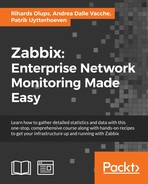 Autoinventory
by Andrea Vacche, Patrik Uytterhoeven, Rihards Olups
Zabbix: Enterprise Network Monitoring Made Easy
Autoinventory
by Andrea Vacche, Patrik Uytterhoeven, Rihards Olups
Zabbix: Enterprise Network Monitoring Made Easy
- Zabbix: Enterprise Network Monitoring Made Easy
- Table of Contents
- Zabbix: Enterprise Network Monitoring Made Easy
- Zabbix: Enterprise Network Monitoring Made Easy
- Credits
- Preface
- I. Module 1
- 1. Getting Started with Zabbix
- The first steps in monitoring
- Zabbix features and architecture
- Installation
- Summary
- 2. Getting Your First Notification
- 3. Monitoring with Zabbix Agents and Basic Protocols
- 4. Monitoring SNMP Devices
- 5. Managing Hosts, Users, and Permissions
- 6. Detecting Problems with Triggers
- 7. Acting upon Monitored Conditions
- 8. Simplifying Complex Configurations with Templates
- 9. Visualizing Data with Graphs and Maps
- 10. Visualizing Data with Screens and Slideshows
- 11. Advanced Item Monitoring
- 12. Automating Configuration
- 13. Monitoring Web Pages
- 14. Monitoring Windows
- 15. High-Level Business Service Monitoring
- 16. Monitoring IPMI Devices
- 17. Monitoring Java Applications
- 18. Monitoring VMware
- 19. Using Proxies to Monitor Remote Locations
- 20. Encrypting Zabbix Traffic
- 21. Working Closely with Data
- 22. Zabbix Maintenance
- A. Troubleshooting
- B. Being Part of the Community
- 1. Getting Started with Zabbix
- II. Module 2
- 1. Zabbix Configuration
- 2. Getting Around in Zabbix
- 3. Groups, Users, and Permissions
- 4. Monitoring with Zabbix
- Introduction
- Active agents
- Passive agents
- Extending agents
- SNMP checks
- Internal checks
- Zabbix trapper
- IPMI checks
- JMX checks
- Aggregate checks
- External checks
- Database monitoring
- Checks with SSH
- Checks with Telnet
- Calculated checks
- Building web scenarios
- Monitoring web scenarios
- Some advanced monitoring tricks
- Autoinventory
- 5. Testing with Triggers in Zabbix
- 6. Working with Templates
- 7. Data Visualization and Reporting in Zabbix
- 8. Monitoring VMware and Proxies
- 9. Autodiscovery
- 10. Zabbix Maintenance and API
- C. Upgrading and Troubleshooting Zabbix
- III. Module 3
- 1. Deploying Zabbix
- 2. Distributed Monitoring
- 3. High Availability and Failover
- Understanding high availability
- Understanding the levels of IT service
- Some considerations about high availability
- Implementing high availability on a web server
- Configuring the Zabbix server for high availability
- Implementing high availability for a database
- Summary
- 4. Collecting Data
- 5. Visualizing Data
- 6. Managing Alerts
- 7. Managing Templates
- 8. Handling External Scripts
- 9. Extending Zabbix
- 10. Integrating Zabbix
- D. Bibliography
- Index
Besides monitoring values to see if something goes wrong, Zabbix has another nice feature. It is possible to gather certain information of your hardware and use this to create some inventory in Zabbix. Knowing we have an API in Zabbix, it can be used to populate our Configuration Management Database (CMDB) later.
Make sure you have your Zabbix server up and running with super administrator rights. We can do this recipe with only the Zabbix server added as host; having said that, it won't hurt if you add a extra host to monitor the inventory from this machine.
- The first thing we do is go to Configuration | Host then click on the host that we want to configure.
- Now click the Host Inventory button and select Automatic from the menu and press Update.

- Now go to the menu to add a new item on the host or create a new template and create a new item in the template.
- Give our item Name the name
Mac Addressas we are going to get the MAC address from our host. - As Type, we select
Zabbix agent. - For the Key we select
system.hw.macaddr[]from the list with keys. - Select the correct Host interface.
- And select
Textas Type of information. - Create a New application for example
Inventory. - Now select the Populates host inventory field and select here
MAC address Afrom the list. - Save the item and wait a bit so that our items gets updated.
- Now go to the menu Inventory | Hosts and select from the right dropdown, the correct host.
- If all went well, you will see the MAC address from your host in Zabbix.

- Now when you go back to Configuration | Hosts and you click on your host, you will see that in the tab Host inventory, the field
MAC address Ais populated.
To get our inventory fields populated, we need to create items on our hosts. Those items have to be linked to fields from our inventory. Once the items are detected the data will be put in the inventory fields from our host. It's good practice to create a specific template to detect certain information that you need and apply the template to all your hosts.
Be careful, not all items work on all operating systems. For instance, it is at times possible that one item works on Fedora and not on Ubuntu, example, OS short name. It is also possible to make use of macros in the reporting. A full list of macros can be found here:
https://www.zabbix.com/documentation/2.4/manual/appendix/macros/supported_by_location.
We could make use of the macros {INVENTORY.LOCATION<1-9>} and {INVENTORY.CONTACT<1-9>} to get notified in case of issues with the location and the contact person for this server.
-
No Comment